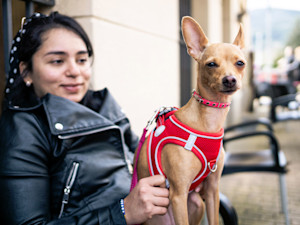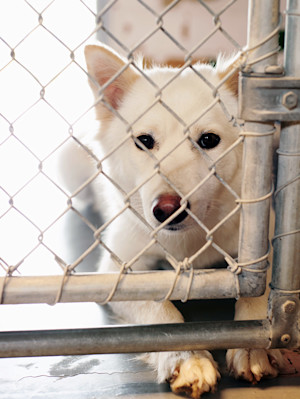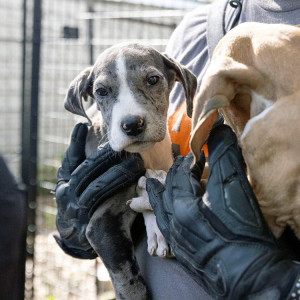Will Colorado’s Proposition 129 Change the Future of Pet Health Care?
Everything you need to know before Election Day.

Share Article
If you have a pet, you've likely heard how chronically overwhelmed folks in the veterinary profession are. Across the country, veterinary offices are struggling to keep up with the overwhelming workload and emotional tollopens in a new tab, and veterinarians and techs are facing an alarming epidemic of burnout, stress, and emotional exhaustion. In Colorado, there is an initiative is on the ballot that addresses the challenges related to both a shortage of veterinarians and an increase in pet ownership.
This November, Colorado voters will weigh in on Proposition 129opens in a new tab, a measure that would create a new mid-level role in this field: the veterinary professional associate (VPA). These VPAs would assist veterinarians by diagnosing, treating, and even performing surgeries—all under a vet’s supervision.
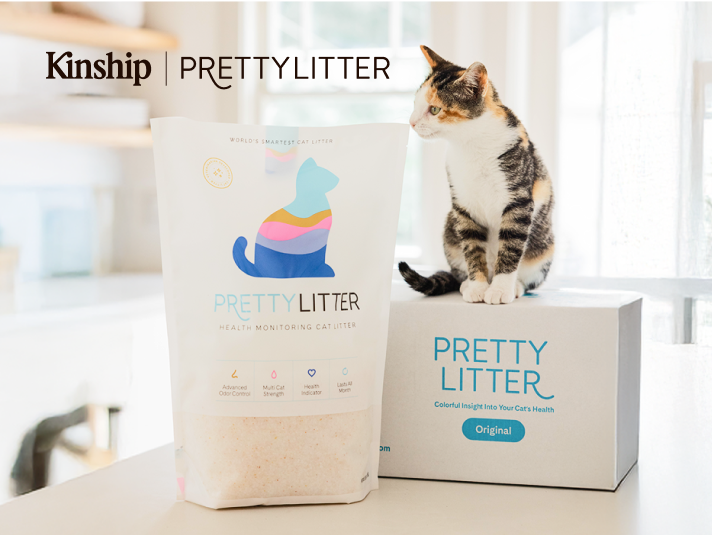
Save on the litter with color-changing tech that helps you better care for your cat.
What’s a VPA?
Most of us at some point have seen a physicians assistant instead of a doctor when going in for an appointment. This ballot initiative would create a veterinary position similar to this role in human medicine (with the major difference being the ability for VPAs to perform surgeries).
The VPA would be a newly trained professional with a master’s degree in veterinary science (and would require registration with the State Board of Veterinary Medicine), allowing them to take on tasks that are currently reserved for fully licensed veterinarians. The goal is to ease the load on overworked vets, reduce wait times, and make pet care more accessible, especially in rural areas. This would also add a career advancement opportunity for veterinary technicians.
Veterinary roles comparison
Veterinarians typically receiveopens in a new tab an undergraduate degree (three to four years) in a relevant field, then an additional four to five years at a veterinary school to receive a doctoral degree in veterinary medicine. In Colorado, only veterinarians can currently diagnose, initiate treatment, prescribe medications, or perform surgery.
A certified veterinary technician typically receives an associate’s degree (two years). They can assist a veterinarian in a clinic or shelter but cannot diagnose, initiate treatment, or perform surgery. Veterinary technician specialists have additional, specialized training.
A veterinary professional associate would receive a typically four-year undergraduate degree in a related field to be admitted into this new master’s program. The proposed program requires five semesters of specialized training. They would be trained to identify abnormal findings on physical examinations and medical tests, to diagnosis and treat routine medical and surgical conditions, such as perform spay and neuter operations. Veterinary professional associates would be required to work under the supervision of a licensed veterinarian while providing these services.
Why this legislation?
Colorado, like many places, is struggling with a vet shortage. According to CBSopens in a new tab, “There are about 3,800 vets in the state for 2.5 million dogs and cats, and that doesn't include horses and farm animals.” A recent survey of Colorado veterinarians by Colorado State University's Animal-Human Policy Center found that 70 percent are turning away animals because they are so overloaded. Long waits for appointments and overwhelmed veterinarians are the norm throughout the country. Supporters of Prop 129 say VPAs could help fix this by expanding the workforce and offering more affordable services for routine care. There is also an argument that this can add a career trajectory with higher pay for many already working in the field as vet techs and similar roles.
Check out the Veterinary Care Accessibility Project’s website opens in a new tabto see where your state lands in terms of accessibility of vet care and to visualize the current state of veterinary accessibility and capacity for care.
The debate
Not everyone is on board. While some see VPAs as the answer to pet care bottlenecks, critics (including the American Veterinary Medical Association [VMA]) worry that these professionals wouldn’t have the same rigorous training as veterinarians, which could affect the quality of care — especially since this role would include performing surgeries and writing prescriptions.
The VMA criticizesopens in a new tab the proposed CSU program noting that it only requires half the credit hours of most DVM programs and only “consists of three semesters of fully online lecture with no laboratory; a fourth semester of truncated basic clinical skills training; and a short internship/practicum” and has “no nationally recognized programmatic accreditation for such a degree, no national test to assess competency, and no regulatory structure to ensure people serving as MLPs/VPAs would deliver safe and effective care for our animal patients.”
There also is an ethical concern of this possibly causing people who are economically disadvantaged to receive lower standards of care for their pets, reports CBSopens in a new tab. However, according to CPR Newsopens in a new tab, others argue that this will expand the options pet owners, especially lower income ones, have to seek care for their pets. While also helping animal shelters that are negatively impacted by the shortage of veterinarians.
An alternate solution noted by the opposition is to expand the roles of veterinary technicians, who already have training and experience, instead of introducing a brand-new position. This actually was done earlier in the year in Colorado through HB 24-1047, also known as the “ Veterinary Technician Scope of Practiceopens in a new tab ” bill. The AVMAopens in a new tab sees this bill as a pathway to help with the veterinary shortage while also providing a career pathway for current veterinary technicians — a position that currently has high retention issuesopens in a new tab due to factors like pay and compassion fatigue. This bill allows Veterinary Technician Specialists (VTS) to assist veterinarians in surgical procedures, perform dental procedures, and in some cases treat minor medical conditions (under the direct/immediate supervision of a licensed veterinarian).
Supporters include the ASPCAopens in a new tab, Animal Policy Group, Vet Care Coalition, Dumb Friends League, Thrive Pet Healthcare, Virtual Veterinary Care Association, and othersopens in a new tab. The opposition (along with the AVMA) includes the American Association of Veterinary State Boards, American Veterinary Dental College, Colorado Veterinary Medical Association, Independent Veterinary Practices Association, and othersopens in a new tab. The Denver Posopens in a new tab also endorses this proposition, with the caveat that CSU needs to not utilize a program that is primarily online (like in the current plan) and expand the hands-on training requirements to make it line up with the requirements in human medicine for PAs.
What’s next, and how does this affect me?
If Colorado passes Proposition 129, it could set the stage for other states to follow suit. Some states (including Colorado) have already allowed vet techs to take on more advanced tasks, and this move could spark broader changes in the field.
For pet parents, this vote is about more than just a new title — it’s about the future of veterinary care. Will VPAs be the game-changer Colorado needs, or is it a risky gamble?
*Note, this article is a Proposition 129 explainer and does not suggest support or opposition on behalf of the author or Kinship. It is up to the reader and voters to determine their own position on this bill.
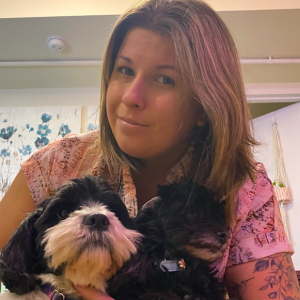
Megan Penney
Megan Penney is a devoted dog mom to Zoey and Mellie, and has fostered over 200 other dogs. While she worked in pet care during graduate school, she now works full time as a non-profit professional and fulfills her passion for pups on the side by volunteering, fostering, and helping others learn about fostering and adopting.
Related articles
![Woman Sitting at Table With Small Dog.]() opens in a new tab
opens in a new tabA Las Vegas Shelter Will Pay You $200 to Foster a Dog
The shelter hopes to free up space as they face overcrowding.
![Sad white dog alone in an animal shelter.]() opens in a new tab
opens in a new tabHealthy Pets Are Being Euthanized in LA Shelters for “Bogus” Reasons
“No kill? It just means slow kill,” one volunteer says of the unprecedented shelter crisis.
![Two people hold their white-and-black dogs, one of whom wears a pink tutu. The woman kisses one of the dogs on the head.]() opens in a new tab
opens in a new tabA California Bill Could Significantly Help Unhoused People and Their Pets
Pet parents wouldn’t have to choose between temporary shelter and keeping their pets.
![Beagle dog being carried by woman in lab coat.]() opens in a new tab
opens in a new tabDog Breeding Facility Fined a Record $35 Million for Animal Cruelty Against 4,000 Beagles
Inotiv, the parent company of Envigo, will pay the largest ever fine issued under the Animal Welfare Act.
![The ASPCA is on the ground in Lake Butler, FL assisting with the rescue of 120 dogs and puppies from an unfit breeding operation.]() opens in a new tab
opens in a new tabThe ASPCA Rescued 300 Mistreated Dogs Across Four States in Only 30 Days
Here’s how they were able to pull off this incredible feat.


